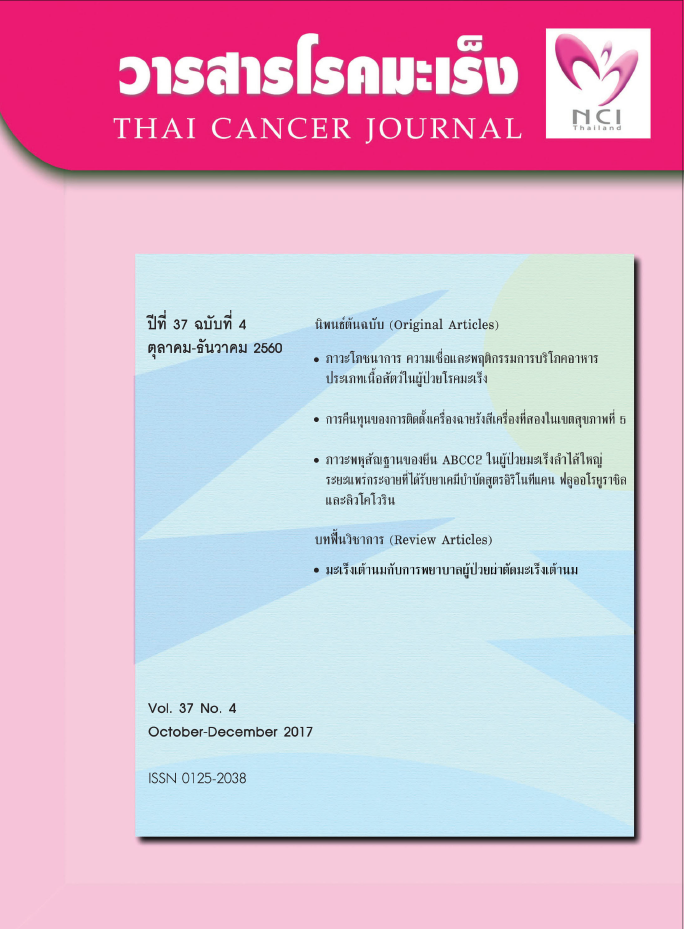Nutritional Status, Beliefs, and Meat-Consumption Behaviors Among Cancer Patients
Keywords:
nutritional status, beliefs, meat-consumption behavior, cancer patientsAbstract
This study aimed to investigate the nutritional status, beliefs, and meat-consumption behaviors of a sample group of cancer patients. The relationship between beliefs and meatconsumption behaviors were analyzed in 385 new cancer patients without chewing and swallowing problems. All patients were diagnosed at Songklanagarind Hospital, Songkhla. The data were collected by questionnaire and analyzed statistically. The results showed that most patients were female (66.2%) with an average age of 54 years. Most patients (32.7%) had female genital organ cancers and 46.8% were in stage 4 of disease. 42.6% of patients were treated with a combination of chemotherapy and radiology. The baseline body mass index (BMI) of the majority of patients (41.1%) was normal (18.5-22.9 kg/m2). The nutritional status of most patients (71.7%) was in level A, defined as no or low risk of malnutrition. The majority of patients believed that all kinds of fermented meat, beef, and processed meat would promote cancer growth and progression. On the other hand, most patients believed that the consumption of marine fish and freshwater fish would not accelerate cancer-cell proliferation. One week before using the questionnaires, most patients had consumed a diet containing marine fish, whole eggs, and freshwater fish, according to their belief that these kinds of food products would not cause cancer progression. The consumption attitudes of these cancer patients significantly affected their meat-consumption behaviors, including their diets of beef, pork, chicken, whole chicken eggs, whole duck eggs, marine fish, freshwater fish, shrimp, squid, shellfish, crab, sausages, Chinese sausages, meatballs, and salted fish (P<0.05). This study showed that the patients' beliefs resulted in reduced dietary meat consumption. Meat is a major source of protein and primary energy for the body. Low levels of meat consumption can result in malnutrition among cancer patients. Enhanced dietary education for cancer patients, regarding appropriate meat consumption, is urgently needed to improve their nutrition and treatment outcomes.
References
International Agency for Research on Cancer. Globocan 2012. Geneva: World Health Organization. Available from: http://globocan.iarc.fr/Pages/fact_sheets_cancer.aspx. Accessed January 14, 2015.
International Agency for Research on Cancer. Globocan 2008. Available from: http://globocan. iarc.fr/en/media-centre/ircnews/2008/index.ph. Accessed October 14, 2015.
American Association for Cancer Research. AACR cancer progress report 2014. Clin Cancer Res 2014;20:S1-S112.
กระทรวงสาธารณสุข. สถิติสาธารณสุข. กรุงเทพฯ: สำนักนโยบายและยุทธศาสตร์ กระทรวงสาธารณสุข 2552.
Donohoe CL, Ryan AM, Reynold JV. Cancer cachexia: Mechanisms and clinical implications. Gastroenterol Res Pract 2011;2011:601434.6. Martignoni ME, Kunze P, Friess H. Cancer cachexia. Mol Cancer 2003;2:36.
จงจิตร อังคทะวานิช.โภชนาการและการกำหนดอาหารในโรคมะเร็ง. กรุงเทพฯ: สำนักพิมพ์ปัญญามิตรการพิมพ์; 2558.
Fleiss JL. Statistical method for rate and proportions. 2nd. New York: John Willey & Sons; 1981.
Detsky AS, Baker JP, O'Rourke K, Johnston N, Whitwell J, Mendelson RA, et al. Predicting nutritionassociated complications for patients undergoing gastrointestinal surgery. JPEN J Parenter Enteral Nutr 1987;11:440-6.
Detsky AS, McLaughlin JR, Baker JP, Johnston N, Whittaker S, Mendelson RA, et al. What is subjective global assessment of nutritional status? J PEN J Parenter Enteral Nutr 1987;11:8-13.
วีระเดช พิศประเสริฐ. การคัดกรองและประเมินสภาวะโภชนาการ. Nutrition Update สมาคมหลอดเลือดดำและทางเดินอาหารแห่งประเทศไทย. กรุงเทพฯ: โรงพิมพ์พราวเพรส; 2556.
ปรียานุช แย้มวงษ์. Nutrition Assessment. โภชนศาสตร์ทางคลินิก. กรุงเทพฯ: สำนักพิมพ์กรุงเทพเวชสาร; 2553.
Natason A. Symptoms and Symptom Managements in Cancer Patients Undergoing Chemotherapy. (Thesis) Khonkaen: Khonkaen University; 2006. p.133.
Tait NS. Anorexia-cachexia syndrome. In: Gronenwald SL, Frogge MH, Goodman M, Yarbro CH (Eds.). Cancer symptom management. 2nd ed. Sudbury, M.A: Jones&Bartlett; 2000. p. 58-78.
อภิรดี ลดาวรรษ์. การสำรวจอาการที่พบบ่อยในผู้ป่วยโรคมะเร็งในภาคใต้. วิทยานิพนธ์ปริญญาโท, มหาวิทยาลัยสงขลานครินทร์. 2548.
Ottery FD. Cancer cachexia: prevention, early diagnosis and management. Cancer Pract 1995;2: 123-31.
Bruera E, Sweeney C. Cachexia and asthenia in cancer patients. Lancet Onco 2000;1:138-47.
Tisdale MJ. Pathogenesis of cancer cachexia. J Support Oncol 2003;1:159-68.
Arends J, Bachmann P, Baracos V, Barthelemy N, Bertz H, Bozzetti F, et al. ESPEN guidelines on nutrition in cancer patients. Clin Nutr 2017;36:11-48.
อังศวีร์ ภณทองสมพงษ์, พรรณวดี พุธวัฒนะ, ธิราภรณ์ จันทร์ดา. ภาวะโภชนาการและการเปลี่ยนแปลงแบบแผนการบริโภคของผู้ป่วยมะเร็งลำไส้ใหญ่และทวารหนักที่ได้รับยาเคมีบำบัด. วารสารโรคมะเร็ง 2557;34:117-28.
Angkatavanich J, Voravud N, Prapakorn J. Quantitative and Qualitative Studies on Food Belief Pattern in Cancer Patients Receiving Chemotherapy and/or Radiotherapy: a Mixed Method Approach. Proceeding andabstract book. The 15th PENSA Congress (Parenteral and Enteral Society of Asia) .Nutrition in clinical practice to improve patient outcome: From supportive to therapy. Bali, Indonesia 27-29 September 2023:93.
สุภาณี เมืองคำ. ภาวะโภชนาการและการบริโภคอาหารของผู้ป่วยเด็กที่ได้รับยาเคมีบำบัด(วิทยานิพนธ์ ). มหาวิทยาลัยเชียงใหม่. 2551
Beagan BL, Chapman GE.Eating after breast cancer: influences on women's actions. J Nutr Educ Behav 2004;36:181-8.
Suwan P, Suwan S. Behavioral science health education and health behavior. Bangkok: Faculty of Public Health Mahidol University; 1993.
กนกพร ประกอบกิจ. ปัจจัยที่มีความสัมพันธ์กับพฤติกรรมการบริโภคอาหารของผู้ป่วยโรคมะเร็งทีได้รับยาเคมีบำบัดในโรงพยาบาลพระมงกุฎเกล้า. (วิทยานิพนธ์). มหาวิทยาลยัเกษตรศาสตร์. 2551
Jowett SL, Seal CJ, Phillips E, Gregory W, Barton JR, Welfare MR. Dietary beliefs of people with ulcerative colitis and their effect on relapse and nutrition intake. Clin Nutr 2004;23:161-70.
Downloads
Published
Issue
Section
License
บทความทีตีพิมพ์ในวารสารโรคมะเร็งนี้ถือว่าเป็นลิขสิทธิ์ของมูลนิธิสถาบันมะเร็งแห่งชาติ และผลงานวิชาการหรือวิจัยของคณะผู้เขียน ไม่ใช่ความคิดเห็นของบรรณาธิการหรือผู้จัดทํา







